Today’s Current Affairs: 31st August 2024 for UPSC IAS exams, State PSC exams, SSC CGL, State SSC, RRB, Railways, Banking Exam & IBPS, etc
Table of Contents
Bureau Of Police Research And Development:
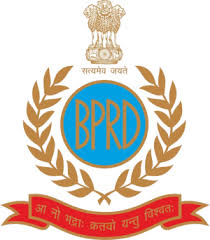
The Bureau of Police Research and Development (BPR&D) recently celebrated its 54th Foundation Day at its headquarters in New Delhi.
- BPR&D plays a pivotal role in shaping policing practices and law enforcement strategies in India.
- The Bureau of Police Research and Development (BPR&D) is a premier research and development organization in the field of policing and law enforcement in India.
- It was established in 1970 under the Ministry of Home Affairs, Government of India.
- It was established with a mandate to:
- Identify the needs and problems of the police in the country.
- Undertake research projects and studies, and suggest modalities to overcome problems and challenges and meet the needs and requirements of the police.
Pathways And Strategies For Accelerating Growth In Edible Oils : Report Of NITI AAyog
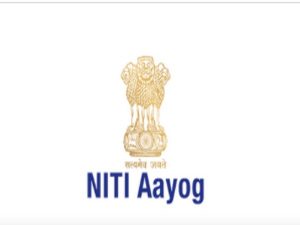
A report titled “Pathways and Strategies for Accelerating Growth in Edible Oils towards Goal of Atmanirbharta” was released by NITI Aayog.
- The report analyses the current edible oil sector, outlines its future potential, and provides a detailed roadmap to address challenges, aiming to close the demand-supply gap and achieve self-sufficiency.
Key Highlights of the Report:
- Oilseed Production and Area: Nine major oilseed crops (groundnut, rapeseed-mustard, soybean, sunflower, sesame, safflower, niger seed, castor and linseed) cover 14.3% of the gross cropped area, contributing 12-13% to dietary energy and about 8% to agricultural exports.
- Soybean leads with 34% of total oilseed production, followed by rapeseed-mustard (31%) and groundnut (27%).
- Regional Production Distribution: Rajasthan and Madhya Pradesh are the top producers, each contributing about 21.42% of national production.
- Gujarat (17.24%) and Maharashtra (15.83%) also play major roles.
- Rising Consumption and Import Dependence: Per capita consumption (over the last decade) of edible oil has surged to 19.7 kg/year.
- Domestic production meets only 40-45% of the demand,overall consumption surged, leading to increased imports from 1.47 MT (million tonne) in 1986-87 to 16.5 MT in 2022-23, raising the import dependency ratio to 57%.
- Palm oil dominates these imports, accounting for 59%, followed by soybean (23%) and sunflower (16%).
- Growth Trends: From 1980-81 to 2022-23, oilseed area, production, and yield grew at rates of 0.90%, 2.84%, and 1.91%, respectively.
- In the recent decade, production and yield growth rates improved to 2.12% and 1.53%. The area under oilseeds increased in all decades except 1991-2000.
- The report projects that production of the nine major oilseeds will rise to 43 MT by 2030 and 55 MT by 2047, up from 37.96 MT in 2021-22 under the Business as Usual (BAU) scenario.
Piezoelectric Polymer:
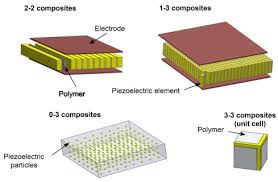
Researchers from Centre for Nano and Soft Matter Sciences (CeNS), an autonomous institute of Department of Science and Technology, in collaboration with scientists from National Chemical Laboratory (CSIR-NCL), Pune have developed a security alert system based on piezoelectric polymer nanocomposite.
- Piezoelectric Polymers are polymers that can generate electric charges on the surface under pressure/strain thus converting mechanical energy into electrical energy.
- These polymers have much higher piezoelectric stress constants indicating that they are much better sensors than ceramics.
- They have low dielectric constant, low elastic stiffness, and low density, which result in a high voltage sensitivity and low acoustic and mechanical impedance (crucial for medical and underwater applications).
- Piezoelectric polymeric sensors and actuators offer the advantage of processing flexibility because they are lightweight, tough, readily manufactured into large areas, and can be cut and formed into complex shapes.
- Polymers also typically possess a high dielectric breakdown and high operating field strength, which means that they can withstand much higher driving fields than ceramics.
D-Voter:
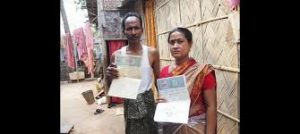
The Assam Chief Minister recently announced that nearly 1.2 lakh people in the state have been identified as ‘D’ (Dubious or Doubtful) voters, with 41,583 declared as foreigners.
- The concept of D-Voter is unique to Assam, where migration and citizenship are among the biggest political fault lines.
- It was introduced in Assam in 1997 by the Election Commission, targeting those who could not prove their Indian nationality.
- Those persons whose citizenship was doubtful or was under dispute were categorized as ‘D- Voters’ during the preparation of the National Register of Citizens in Assam.
- ‘Doubtful voter’ or ‘doubtful citizenship’ have not been defined in the Citizenship Act, 1955, or the Citizenship Rules of 2003.
- The Citizenship Rules, 2003, was framed under the provisions of the Citizenship (Amendment) Act, 2003.
- The rules framed in 2003 list out the steps to be followed for the preparation of the National Population Register (NPR) and the National Register of Indian Citizens (NRIC).
- Under subsection 4 of section 4 that deals with the preparation of NRIC, it has been only mentioned that details of individuals whose citizenship is doubtful will be entered by the Local Registrar with ‘appropriate remark in the population register for further enquiry’.
- A family or individual is notified in a specific pro forma as soon as the verification process concludes whether they have been classified as a dubious citizen (D-Category).
- Before deciding whether or not to add their name to the register, they are alsogiven the opportunity to be heard by the Taluk, or Sub-district Registrar of Citizenship. The Registrar has ninety days to complete and justify his findings.
- Because their Indian citizenship has not been verified, doubtful voters are not allowed to vote in elections.
- They are also not permitted to run for office in the nation’s elections.
- The marking as doubtful voter is a temporary measure and cannot be prolonged. A decision in a definite period of time must be taken.
- According to the documentation provided, if it is determined that the individual is a foreign national or an illegal immigrant, they may be deported or placed in a detention centre.
- D- Voters also have the option to apply and get their names included in NRC.
- They will be included only after they get clearance from the Foreigners Tribunals and their names are removed from electoral rolls under the ‘D’ category.
SHe-Box Portal:

Union Ministry of Women and Child Development recently launched the new SHe-Box portal.
- SHe-Box Portal is a centralized platform for registering and monitoring complaints of sexual harassment of women in the workplace
- It serves as a centralized repository of information related to Internal Committees (ICs) and Local Committees (LCs) formed across the country, encompassing both the government and private sectors.
- It offers a common platform to file complaints, track their status, and ensure time-bound processing of complaints by ICs.
- It provides assured redressal of complaints and a streamlined process for all stakeholders.
- The portal will also enable real-time monitoring of complaints through a designated nodal officer.
- The portal will ensure that complaints can be safely registered without personal information being publicly accessible.
- The SHe-Box portal can be accessed at https://shebox.wcd.gov.in
- In 2017, an upgraded version of SHe-Box was launched based on The Sexual Harassment of Women at Workplace (Prevention, Prohibition, and Redressal) Act, 2013, where women who are harassed at any workplace can register their case on this, SHe-Box, file their complaint, and then two types of committees will be formed.
- One, for private institutions, an internal committee will be formed, and for government institutions, a local committee will be formed under the chairmanship of the DM or DC or an officer appointed by them, and actions will be taken by them from time to time.
Finternet:

The ex-chairman of UIDAI described the idea of ‘Finternet’ at the Global Fintech Fest (GFF) in Mumbai.
- Finternet refers to the multiple financial ecosystems interconnected with each other, much like the internet.
- It would lower barriers between different financial services and systems, drastically reducing the complex clearing and messaging chains and other frictions that hinder financial system
- It would be built on unified ledgers which will bring multiple financial markets such as tokenized assets, shares, bonds, real estate, on a single programmable platform.
- It has the capability to enable individuals and businesses to transfer any financial asset they like, in any amount, at any time, using any device, to anyone else, anywhere in the world. Financial transactions would be cheap, secure, and near-instantaneous.
- It will be user-centric, unified, which means it will cover all types of assets, with a universal infrastructure.
- It would reduce the complex processes that happen behind-the-scenes today and make transactions slower and expensive.
- Central banks would remain at the core of the system, ensuring trust in money, but (like today) work closely with commercial banks.
Bonus Issue:

Reliance Industries Chairman recently announced a bonus issue for the company’s shareholders in a 1:1 criterion.
- A bonus issue, also known as a scrip issue or a capitalization issue, occurs when a company listed on a stock exchange decides to offer free additional shares to the existing shareholders.
- The company decides the number of bonus shares to be allotted to every individual investor for holding a certain number of shares over a set period of time and accordingly rewards them.
- For example, a company may give one bonus share for every five shares held.
- This bonus issue aims to attract further investment and reward its existing shareholders as it improves the entity’s market image.
- A bonus issue of shares will increase a company’s share capital but not its market capitalisation.
- Market capitalisation is calculated by multiplying the company’s current stock price and the total number of outstanding shares. Share capital is the amount that the company raises by issuing shares.
- By issuing bonus shares, the number of outstanding shares increases with a proportional decrease in the value of each share, ensuring no change in the market capitalization. However, the face value of the shares remains unchanged.
- They do not dilute shareholders’ equity because they are issued in a constant ratio that keeps the relative equity of each shareholder the same as before the issue.
- A bonus share issue is funded by the company’s healthy profits reflected in its annual or quarterly results or from its share reserves.
- The issuance of bonus shares is not taxable; however, shareholders must still pay capital gains taxif they sell them for a net gain.
RESET Programme:
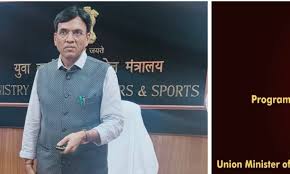
The Union Minister of Youth Affairs & Sports and Labour & Employment launched “Retired Sportsperson Empowerment Training” (RESET) Programme on the occasion of National Sports Day in New Delhi.
- The Retired Sportsperson Empowerment Training Programme is aimed at empowering the retired sports persons who have played for the country and brought immense laurels to the nation.
- It will support retired athletes on their career development journey by empowering them with the necessary knowledge and skills and making them more employable.
- It represents a significant step towards recognizing and utilizing the invaluable experience and expertise of our retired athletes.
- The athletes, who have retired from an active sports career and are aged between 20-50 years and who have been winners of an International Medal/participants in international events or have been National medallists/State medallists/participants in competitions recognized by National Sports Federations/Indian Olympic Association/Ministry of Youth Affairs and Sports are eligible to apply for courses under RESET Programme.
- Initially, the programmes will be of two levels based on educational qualifications viz., Class 12th and above and Class 11th and below.
- For this pilot phase of the RESET Programme, Lakshmibai National Institute of Physical Education (LNIPE) will be the lead institute to implement the Programme.
- The programme will be offered in hybrid mode consisting of self-paced learning through a dedicated portal, along with on-ground training and internship.
- Internships will be provided in sports organizations, sporting competitions/training camps, and leagues. Further, placement assistance, guidance for entrepreneurial ventures, etc. will be provided upon successful completion of the course.
Unified Payments Interface (UPI) block mechanism:
Securities and Exchange Board of India (SEBI) proposed mandatory Unified Payments Interface (UPI) block mechanism facility for secondary market trading using the UPI-based block mechanism to their clients.It is similar to the Application Supported by Blocked Amount (ASBA) facility that allows trading with blocked amounts.
New Chairman Of The International Cricket Council:
Jay Shah has been elected as the new chairman of the International Cricket Council (ICC), becoming the youngest ever to reach this position.He currently holds the position of Board of Control for Cricket in India (BCCI) secretary and will take over the charge at ICC from 1st December, 2024, succeeding Greg Barclay of New Zealand as ICC chairman He became the fifth Indian to become ICC chairman after Jagmohan Dalmiya, Sharad Pawar, N Srinivasan and Shashank Manohar
Guru Padmasambhava:
A two-day conference on the Life and Living Legacy of Guru Padmasambhava was held in Nalanda, Bihar, organised by the International Buddhist Confederation (IBC) and Nava Nalanda Mahavihara. The event will focus on Guru Padmasambhava’s adaptation of Buddhist teachings to local cultures and traditions. Guru Padmasambhava, also known as Guru Rinpoche, was an 8th-century sage whose teachings significantly shaped the dissemination of Buddha Dhamma across the Himalayan region and is regarded as the second Buddha.
National Council of Applied Economic Research:
Monthly Economic Review of the National Council of Applied Economic Research (NCAER) for August acknowledges that the domestic economy remains resilient. However, it highlighted moderation in certain high-frequency indicators, such as industrial output and core sectors’ performance in June.
PM Modi to Inaugurate Vadhvan Port and Address Global Fintech Fest in Maharashtra:
Prime Minister Narendra Modi will visit Maharashtra to lay the foundation stone of the Vadhvan Port project and address the Global Fintech Fest (GFF) 2024 in Mumbai. Modi will start his day in Mumbai and then proceed to Palghar in the afternoon.
First Indigenously Developed Pollution Control Vessel Launched in Goa:
The Indian Coast Guard (ICG) launched its first indigenously developed Pollution Control Vessel, ‘Samudra Pratap,’ in Goa. Raksha Rajya Mantri Shri Sanjay Seth, who presided over the event, emphasized the need for industry partners to contribute towards India becoming fully self-sufficient (Aatmanirbhar) in defense production and a net exporter.
LIC Pays ₹3,662 Crore Dividend to Indian Government:
Life Insurance Corporation of India (LIC) presented a dividend cheque of ₹3,662.17 crore to Union Finance and Corporate Affairs Minister Nirmala Sitharaman. This follows the shareholder approval of a final dividend of ₹6 per share for 2023-24, up from ₹3 per share in the previous fiscal year
New Zealand’s Māori King Dies After 18-Year Reign:
New Zealand’s Māori King, Kiingi Tuheitia Pootatau Te Wherowhero VII, passed away on August 30, 2024, at the age of 69, just days after celebrating 18 years on the throne. He was the seventh monarch of the Kiingitanga movement, established in 1858 to unify Māori tribes against British colonization.




